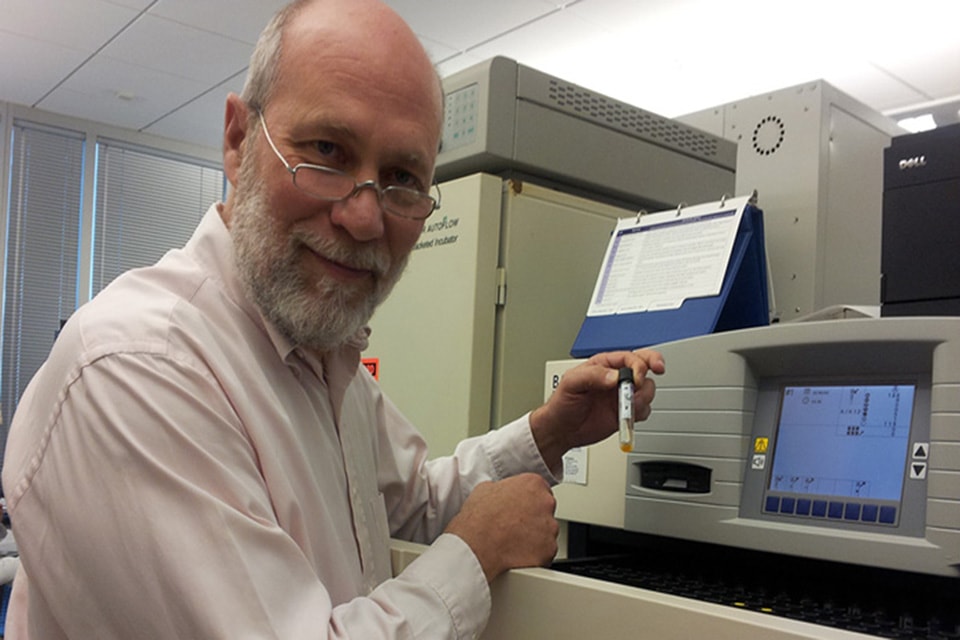SLU COVID-19 booster vaccine clinical trial seeks vaccinated volunteers
A clinical trial is testing the safety, tolerability, and immune responses stimulated by different doses of investigational booster vaccines designed to improve duration of immunity and improve immunity against variants of the virus that causes COVID-19.
Researchers at Saint Louis University are enrolling volunteers in the second stage of a Phase 1 vaccine trial designed to test the safety, tolerability, and immune response to investigational second-generation COVID-19 vaccines. Phase 1 vaccine trials are designed to test the safety and tolerability and immune response of new investigational vaccines.
The study is recruiting people who have already received a primary vaccination series of either an approved mRNA (Pfizer or Moderna mRNA) or the approved Johnson & Johnson recombinant adenovirus (Ad.26) COVID-19 vaccine and a single booster vaccination (with an mRNA vaccine). Those who have already received a second booster vaccination against SARS-CoV-2, the virus that causes COVID-19, are not eligible.
The investigational COVID-19 vaccines are different from current approved vaccines and may provide advantages over boosting with one of the approved vaccines. They are designed to elicit an immune response to multiple SARS-CoV-2 proteins, in addition to the spike protein targeted by currently available vaccines made by Moderna, Pfizer and Johnson & Johnson.
The investigational vaccines are also designed to elicit more extensive T cell responses, which are not elicited by the approved vaccines.
By targeting several coronavirus proteins, the investigational vaccines may provide enhanced protection against a wide variety of SARS-CoV-2 strains and variants. In animal models of COVID-19 infection, the investigational vaccines protected against experimental infection and resulted in high levels of antibodies.
“We need to develop new COVID-19 vaccines that can protect against future SARS-CoV-2 variants that develop which the investigational vaccines we are studying in this trial have the potential to do, while providing protection in the form of T cells,” said Daniel Hoft, M.D., Ph.D., professor of medicine, molecular microbiology and immunology, director of the Saint Louis University Center for Vaccine Development and overall protocol chair of the trial.
According to Getahun Abate, M.D., principal investigator for the trial at SLU, great strides have been made in overcoming the initial havoc caused by the COVID-19 pandemic.
“Vaccines are now available for prevention of COVID-19,” Abate said. “However, because the virus is changing itself to become more transmissible and sometimes more deadly, we should not lose focus and should continue our endeavors to bring forth improved vaccines.
“We want new vaccines that give protection against circulating and newly emerging strains as well as provide a long-lasting immunity. To achieve these goals, we want volunteers who already received EUA or approved COVID-19 vaccines to participate in an ongoing investigational vaccine study at Saint Louis University.”
To enroll, participants must be older than 60 years of age, healthy, without significant allergies, and have been vaccinated and boosted once against COVID-19 at least four months prior to enrollment.
Participants will be asked to:
- Make nine to 14 or more study clinic visits in-person and will also receive one to two telephone check-ins with the study staff over 12 to 14 months
- Receive one or two injections of an investigational booster vaccine
- Have blood drawn several times for safety monitoring and to see whether the vaccine resulted in an immune response
- Keep track of how they’re feeling after the injection
Interested participants should contact: The Saint Louis University Center for Vaccine Development
- Email: vaccine@slu.edu
- Telephone: 866-410-6333
For more information about the trial, visit ClinicalTrials.gov. The study’s Clinical Trials Identifier is NCT04776317.
The study is sponsored and funded by the U.S. National Institute of Allergy and Infectious Diseases (NIAID), part of the National Institutes of Health, and is being conducted through the NIAID-supported Infectious Diseases Clinical Research Consortium.
About the Saint Louis University Center for Vaccine Development
Saint Louis University has been on the front lines in the fight against pandemics and global health crises for more than three decades and first received federal funding for vaccine research in 1989.
Led by Daniel Hoft, M.D., Ph.D., SLU’s Center for Vaccine Development is one of only 10 institutions selected by the National Institutes of Health as a Vaccine and Treatment Evaluation Unit (VTEU).
As a VTEU, the Center helps develop and evaluate vaccines that will protect people from infectious diseases and emerging threats. It conducts Phase 1 through 4 vaccine and treatment trials, including clinical studies in collaboration with industry partners. Hoft serves as the VTEU’s principal investigator.
About the Saint Louis University School of Medicine
Established in 1836, Saint Louis University School of Medicine has the distinction of awarding the first medical degree west of the Mississippi River. The school educates physicians and biomedical scientists, conducts medical research, and provides health care on a local, national and international level. Research at the school seeks new cures and treatments in five key areas: infectious disease, liver disease, cancer, heart/lung disease, and aging and brain disorders.


















